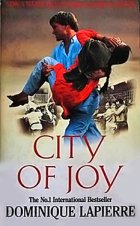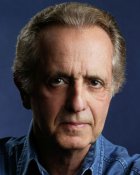
City of Joy Page #16
- PG-13
- Year:
- 1992
- 132 min
- 795 Views
COURTYARD:
Ashoka sits behind a little table, picking absently athis face. The Goonda is slouched near the table, smokinga cigarette and fiddling with a thin switch. (It's difficult
for him to show Ashoka the respect his inheritedposition gives him.) The Goonda has a bruise under one
eye from his altercation in the City of Joy yesterday.
The air is filled with the MUFFLED SOUNDS OF the STREET.
FROM here, we can see the evermore enfeebled godfatherin his "throne room," wrapped in a cashmere, listening
to the radio. Ashoka looks up, stares impassively at
someone.
ASHOKA:
Well. What have you got to say?
ANOTHER ANGLE:
For the first time, we see who Ashoka's speaking to.
HASARI:
I told them that your fatherprovides us with a great deal andthat --
Ashoka slams his hand on the register.
ASHOKA:
From this minute, you are off thelist! You will leave your rickshawhere... where it will be reserved
for a man who deserves our trust.
He stands up. Hasari is near tears.
HASARI:
Please, Babu, this is as if the
ground has opened up. I have to
speak to Mr. Ghatak!
Hasari starts for the house. The Goonda stops him and,
quickly, has Hasari on his knees, his arm twisted painfully
behind his back. Ashoka jumps at Hasari, grabshis ear.
ASHOKA:
My father's ill! You are speakingto me!
(CONTINUED)
83.
CONTINUED:
HASARI:
I have a family!
ASHOKA:
The decision is made. I have made
it. Now get out before I have Mr.
Bhose break your legs.
He gives Hasari's ear a vicious twist and slams his headagainst the table.
EXT. GODFATHER'S HOUSE - DAY
The side gate opens and Hasari is shoved out. Stumbling,
he runs to the fence, peers through. Two men are pullinghis rickshaw into the courtyard. Hasari watches as a
steel shutter is pulled down, cutting his livelihood fromsight.
Numb, compromised, defeated. Perhaps the low point ofhis life.
INT. CLINIC - JOAN'S ROOM - "RAFT OF MEDUSA" - NIGHT
Flickering candlelight illuminates the "Raft of Medusa."
Max rails at Joan.
MAX:
I just don't... I don't want to...
I don't want to care! I don't want
to care this much! I just don'twant to be invested in you people.
In people! I became a goddamndoctor because my goddamn fatherwanted me to be a goddamn doctorbecause he was a goddamn doctor!
He was the goddamn king ofdoctors! It's too goddamn hard!
Out of breath, out of words, Joan reaches out and takes
Max to her, brings him beside her on the cot. Beneath
the "Raft of Medusa," she sits with an arm around Max, as
if he were her son.
JOAN:
Not everyone's cut out for this.
You did the best you could.
Better than many. It's all right.
(CONTINUED)
84.
CONTINUED:
MAX:
I didn't do the best I could! I
did what I always do! I shot mybig mouth off and did a half-assedjob. And what I want to do now is
I want to go back to America andmake money and live a life withoutentanglements and demands andpeople hanging on me.
JOAN:
(a beat)
You know, the fact is from the
minute we're born we're
shipwrecked. Some see that as a
lifetime of drowning, of fear,
others only to endure, but totriumph. It's all in the
individual spirit, isn't it?
MAX:
Got it:
To run, to spectate, tocommit.(raises his hand)
Running spectator.
JOAN:
Then, by all means, go home, Max,
and go with my blessing and myeternal friendship.
The candlelight flickers against them as they sit sideby side. Neither speaks.
EXT. RAM'S HUT - TEA SHOP - NIGHT
At the tea shop, a group relive the day's events. The
children sleep. Aloka sits outside, worried about
Hasari.
Max comes out, meets Aloka's eyes and looks away. She's
heard the conversation.
Hasari, drunk, comes down the slope. Face to face with
Max.
HASARI:
They took away my rickshaw.
Aloka's hand flies to her mouth. Hasari peers at Maxwith his drunken gaze. It's a terrible moment for Max,
but...
(CONTINUED)
85.
CONTINUED:
MAX:
So what do you want me to do aboutit -- get it back for you?
Max takes away a step. Stops.
MAX:
I'm sorry. I'm going home.
Because this isn't my fight. I
got one person to look after -me.
Hasari stares at Max. On the roof, the children listen.
At the tea shop, the late-night talkers listen.
MAX:
All right, I'm running out, okay?
Because I'm a coward, this is me,
this is what I do, I get in overmy head, I let people down, I run.
HASARI:
But I trusted you.
MAX:
Well, that was your goddamnmistake!
Max walks away, leaving Hasari desolate. Aloka comes to
him.
HASARI:
I don't know how I'm going to paythe rent, how we're going to eat.
ALOKA:
We have what is saved for Amrita's
dowry.
The thought of using the dowry is yet another awful blowto Hasari's hopes.
HASARI:
The children must leave the
school; they'll have to work. And
you will not have anything to dowith the clinic or those people
anymore.
Ram joins them.
RAM:
What I earn is yours, too.
(CONTINUED)
86.
CONTINUED:
HASARI:
You can't support all of us. You
have a family in your village, too.
Hasari touches his friend and goes into:
INT. RAM'S HUT
Alone in his pain, he spots his tea caddy in which heplanted his seeds over a month ago. He bends over to
tenderly touch the growing shoot and water the earth.
He looks up and the three children are staring at him.
What will their father do now to keep them alive?
INT. BLOOD DISPENSARY - CLOSE ON HASARI'S ARM - DAY
The needle injected, Hasari's blood flowing into abottle.
ANOTHER ANGLE:
Hasari seated on the stool, watching his blood leave hisbody, his face again broken out in perspiration.
HIS POV - RAFIK
Waiting.
BACK TO SCENE - HASARI
His face immobile, his thoughts distant. The Attendant
starts to pull the needle out. Hasari stops his hand.
HASARI:
Take more.
The Attendant shakes his head.
HASARI:
Take more.
The Attendant looks at Rafik, who shrugs, nods... andallows the blood to flow on out of Hasari's body.
EXT. BLOOD BANK - DAY
Barely ambulatory, Hasari starts down the street, but hasto stop, lean against a wall. Through his woozy haze, hethinks he sees an apparition.
87.
ANOTHER ANGLE:
There, in the entrance to a building, is Gangooly.
Seeing a potential victim, he swoops in.
GANGOOLY:
Not well, brother?
HASARI:
Still stealing from refugees?
Gangooly looks at Hasari, recognizes him, and gives himan amazing smile.
GANGOOLY:
Well, yes, I remember you, of
course -- hello! I am delighted
to see you -- yes. And tell me
immediately, please -- your little
family, your beautiful children,
everyone eats, yes. Come, have a
cup of tea or a little something
stronger, we must celebrate.
Gangooly starts to move, to position himself for a getaway.
Hasari blocks his egress, unsmiling.
GANGOOLY:
Ah, well, you're angry at me, yes,
I wondered if that was still on
your mind -- I am full of regret
about that, yes, even a little
tormented. What can I say? I have
Translation
Translate and read this script in other languages:
Select another language:
- - Select -
- 简体中文 (Chinese - Simplified)
- 繁體中文 (Chinese - Traditional)
- Español (Spanish)
- Esperanto (Esperanto)
- 日本語 (Japanese)
- Português (Portuguese)
- Deutsch (German)
- العربية (Arabic)
- Français (French)
- Русский (Russian)
- ಕನ್ನಡ (Kannada)
- 한국어 (Korean)
- עברית (Hebrew)
- Gaeilge (Irish)
- Українська (Ukrainian)
- اردو (Urdu)
- Magyar (Hungarian)
- मानक हिन्दी (Hindi)
- Indonesia (Indonesian)
- Italiano (Italian)
- தமிழ் (Tamil)
- Türkçe (Turkish)
- తెలుగు (Telugu)
- ภาษาไทย (Thai)
- Tiếng Việt (Vietnamese)
- Čeština (Czech)
- Polski (Polish)
- Bahasa Indonesia (Indonesian)
- Românește (Romanian)
- Nederlands (Dutch)
- Ελληνικά (Greek)
- Latinum (Latin)
- Svenska (Swedish)
- Dansk (Danish)
- Suomi (Finnish)
- فارسی (Persian)
- ייִדיש (Yiddish)
- հայերեն (Armenian)
- Norsk (Norwegian)
- English (English)
Citation
Use the citation below to add this screenplay to your bibliography:
Style:MLAChicagoAPA
"City of Joy" Scripts.com. STANDS4 LLC, 2025. Web. 7 Feb. 2025. <https://www.scripts.com/script/city_of_joy_358>.







Discuss this script with the community:
Report Comment
We're doing our best to make sure our content is useful, accurate and safe.
If by any chance you spot an inappropriate comment while navigating through our website please use this form to let us know, and we'll take care of it shortly.
Attachment
You need to be logged in to favorite.
Log In